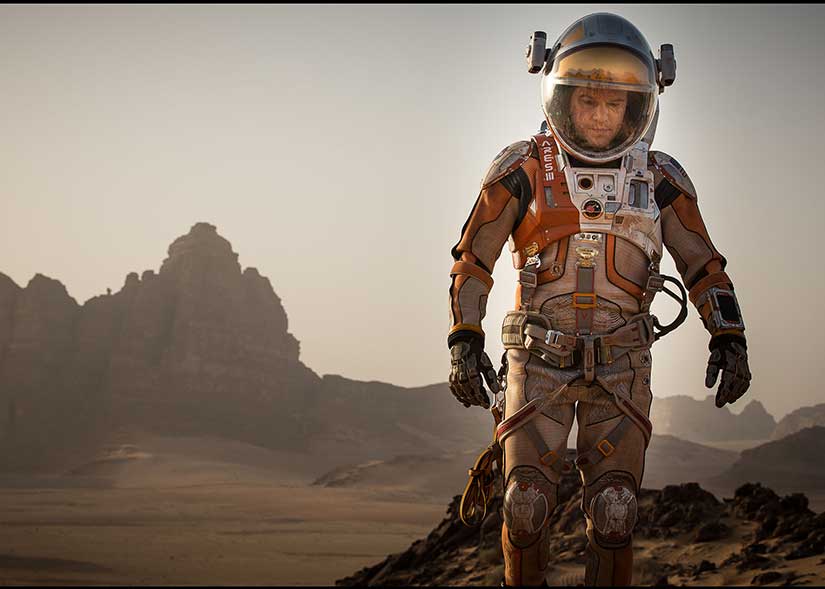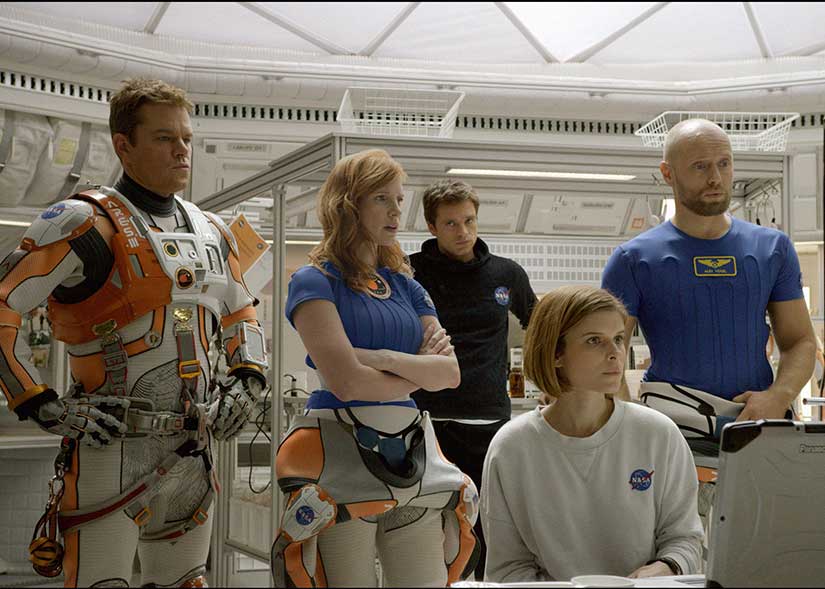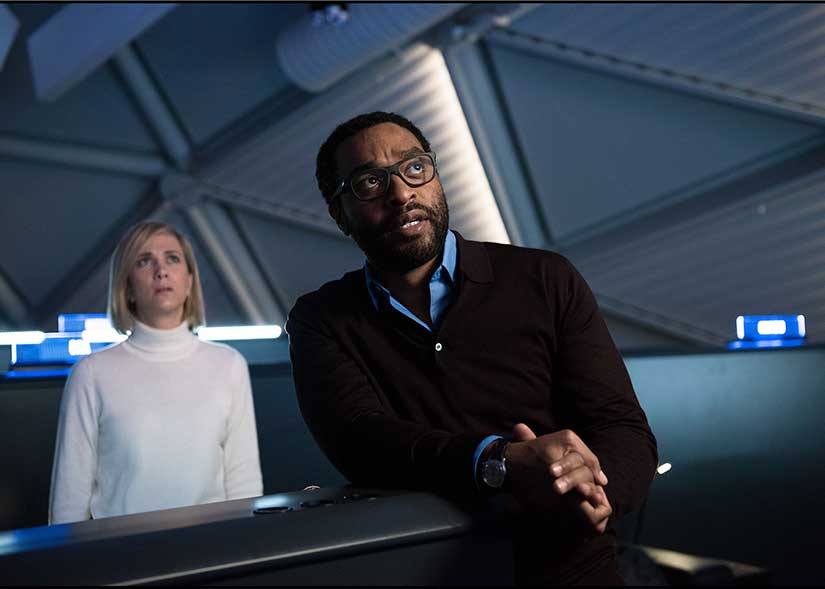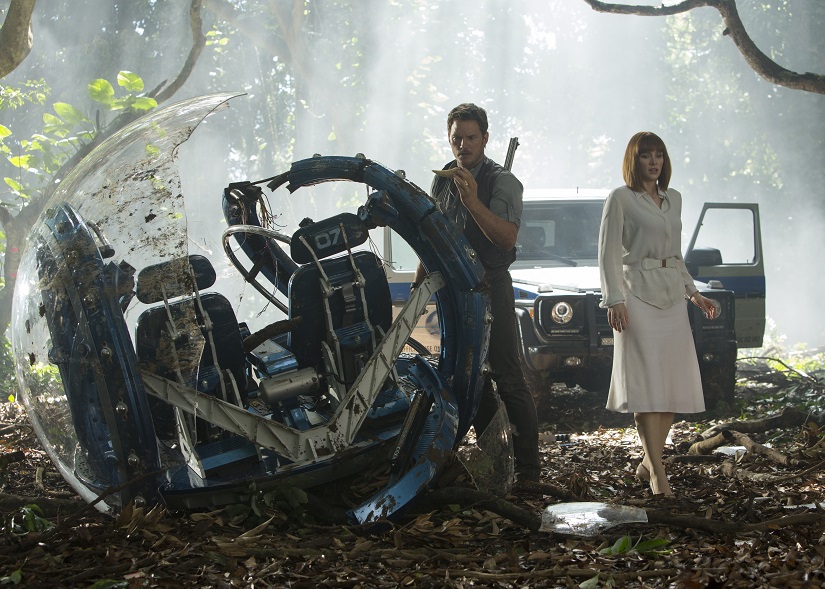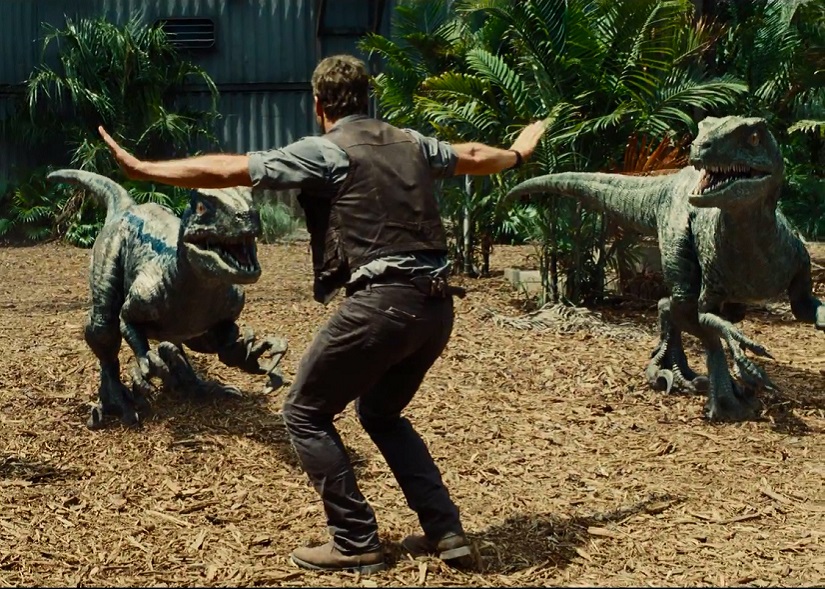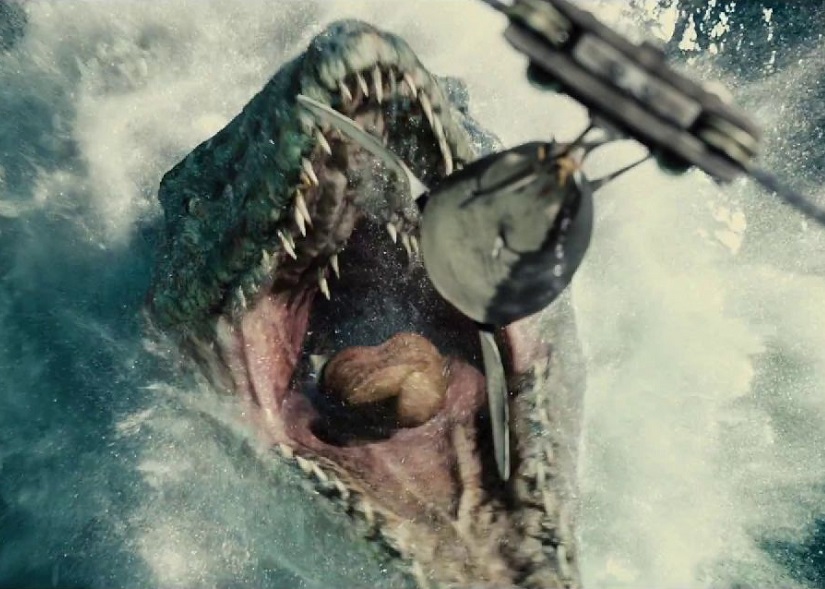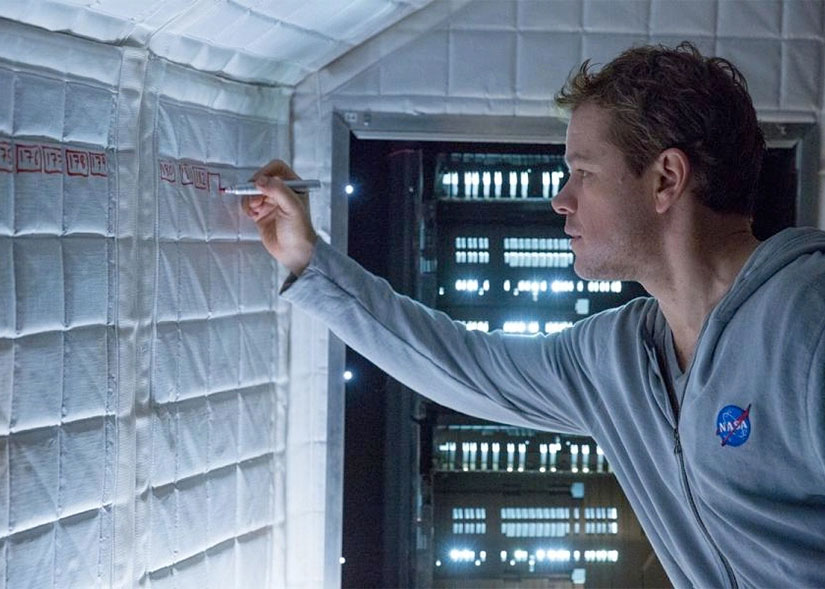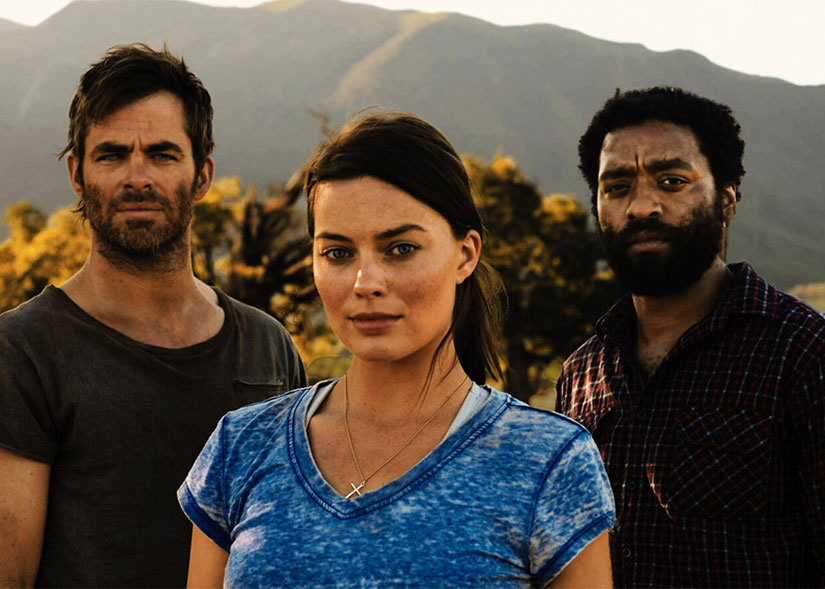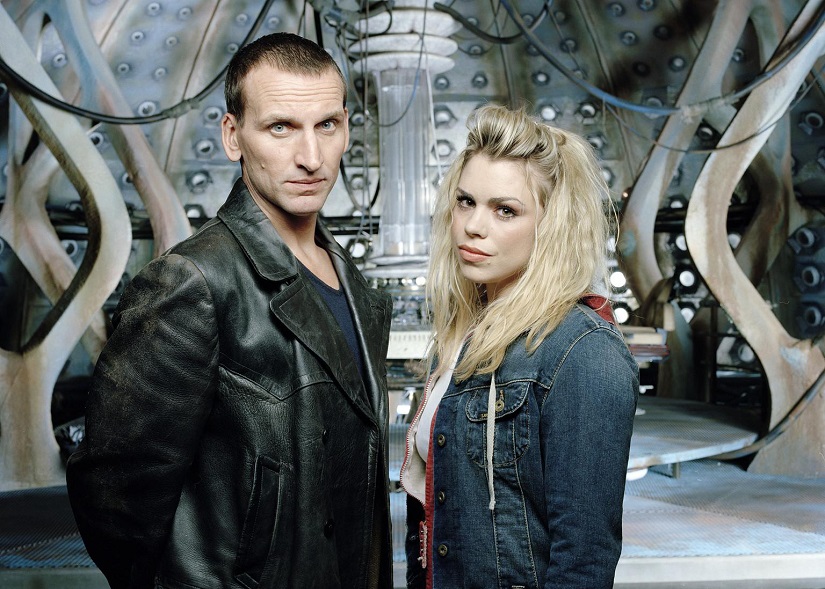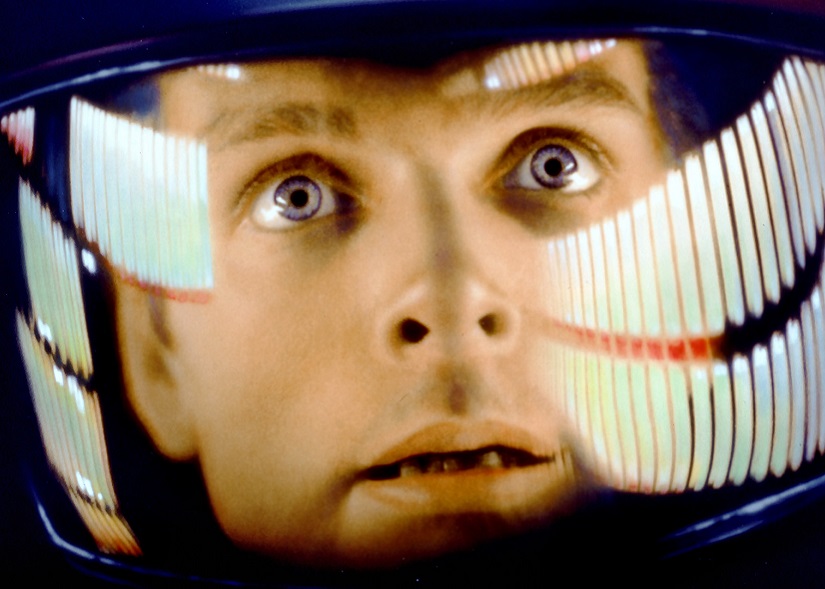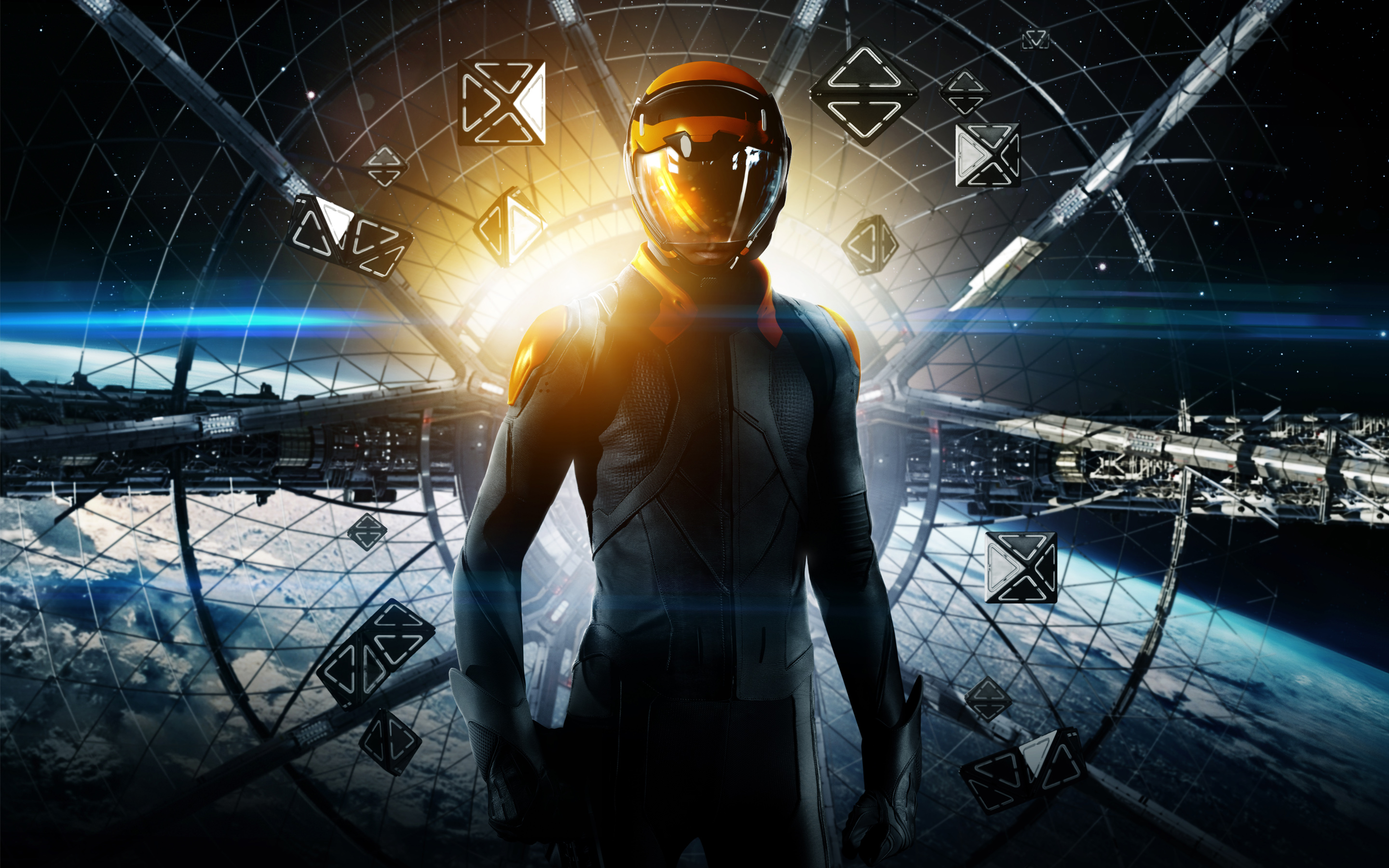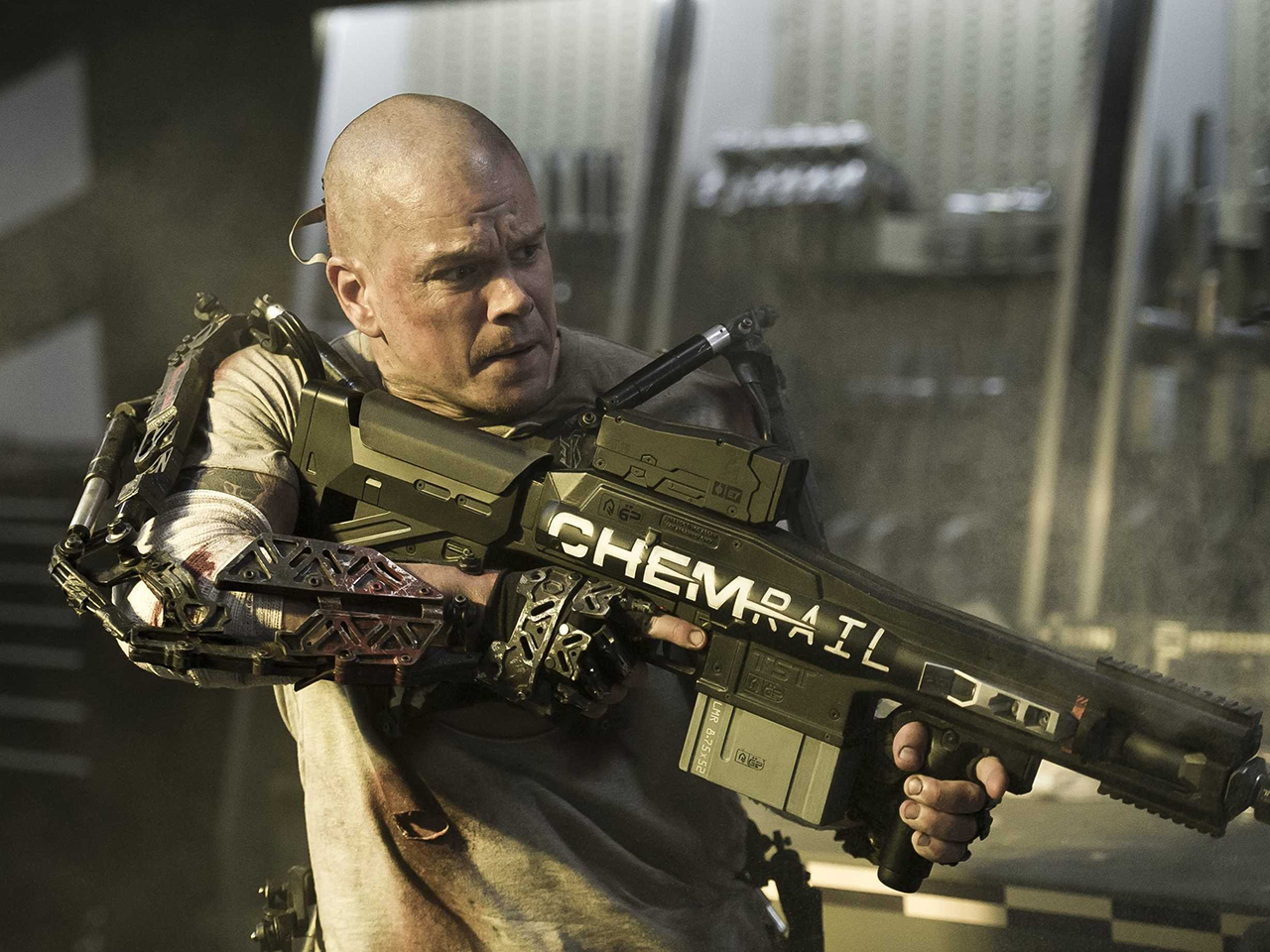[Review] The Martian
Space has been the "final frontier" for decades, yet it's only been in recent years where a steady in flux of space-centric films have been able to find the critical and commercial success that their B-movie forefathers only dreamed about. Following in line with similar films like 2013's Gravity and 2014's Interstellar comes Ridley Scott's most recent foray into the stars: The Martian. Adapted by the novel of the same name by Andy Weir, The Martian features an exceptionally talented ensemble cast, a strong performance by Matt Damon, and perhaps director Ridley Scott's return to grace following the cold reception he's received for his latest films.
[youtube id="ej3ioOneTy8"]
The Martian
Director: Ridley Scott
Rating: PG-13
Release Date: October 2, 2015
Halfway through a manned mission to Mars, a storm hits that causes the crew of Ares III to immediately evacuate. However, a crew member, Mark Watney (Matt Damon), is believed dead after a piece of equipment struck and concealed him from the rest of the crew. As NASA delivers the untimely message to the entire country, it's soon discovered that Watney survived the storm as he must rely on his wits and scientific knowledge to survive the next three years before the next manned mission to Mars takes place. Soon enough, Watney's movements are detected by NASA, who must then decide how to present the discovery to the media (after initially declaring him dead), as well as conceive of a successful rescue mission, despite the odds.
While the main attraction to The Martian will be Damon's great performance (and rightfully so), the film wouldn't have been as successful or entertaining as it is without its ensemble cast that includes such actors as Jessica Chastain (Interstellar), Kristen Wiig (Bridesmaids), Chiwetel Ejiofor (Z for Zachariah), Jeff Daniels (Looper), Michael Peña (Ant-Man), Kate Mara (Fantastic Four), Sebastian Stan (Captain America: Civil War), and a surprise (and fun!) role by Donald Glover (Community). Buoying the main plot of bringing Watney home comes a more substantial one in which NASA must circumvent the political/business trappings of the organization and their genuine interest in saving Watney's life, allowing the main plot an added sense of grounded context that allows audiences to further empathize with the characters.
Whereas Gravity lacked the supporting cast and direct narrative and Interstellar lost viewers with a convoluted and confusing plot, The Martian takes the best from the preceding films and fills in what each lacked. Furthermore, Damon's Watley is at times awe-inspiring with his knowledge and never-fail attitude, yet still relatable to audiences with his charm and sophomoric (re: endearing) humor. In short, if you felt Gravity and Interstellar were good films that lacked that certain something, The Martian could be what you've been waiting for.
Those worried that Scott lost his magic following the lacking Prometheus, The Counselor, and Exodus: Gods and Kings should find solace knowing that Scott's back on the right track. The Martian possesses a story deep enough for thinkers to enjoy and casual viewers to understand, a stellar cast that gets the right amount of time for their talents/characters to shine, and a great lead performance by Damon. Make sure you catch The Martian as soon as you can.
[Review] Jurassic World
Many people expected Jurassic World to be a hit, though few would have predicted quite how big a hit it would turn out to be. In retrospect, it's easy to appreciate how complete the movie's formula actually is: dinosaurs will always be a major draw for children, especially when fighting other dinosaurs, while older viewers have the strong nostalgia factor of Steven Spielberg's 1993 adaptation of Michael Crichton's novel, Jurassic Park, to lure them in. Throw in one of Hollywood's fastest rising stars in the shape of Chris Pratt, and suddenly that record-breaking take doesn't seem quite so surprising.
Despite its big reputation, the original Jurassic Park never won me over as completely as those whose nostalgia is among the many reasons World is on its way to global domination. There's no question that Park was an extraordinary cinematic event, one of the few movies of the past thirty years to inspire a genuine sense of awe in its viewers, but whether it coheres as a great film in its entirety, rather than a handful of magnificent scenes and a cast which happened to be a perfect fit for the material and each other, is up for debate. Regardless, the moments when it really delivered are rightly celebrated among the finest moments of Spielberg's glittering career and few can deny its importance as a cultural phenomenon of its time. For all its astounding financial success, Jurassic World seems unlikely to be held in such high regard in twenty years' time.
[youtube id="RFinNxS5KN4"]
Jurassic World
Director: Colin Trevorrow
Rating: PG-13
Release Date: June 12th, 2015
That's not to suggest Jurassic World is a bad movie per se, but one which is best taken with strongly tempered expectations. It delivers all the dinosaur-on-dinosaur action that viewers will be expecting and is certainly the best of the three Jurassic Park sequels, though that's faint praise if ever there were such a thing. It's a movie which feels acutely aware of the likelihood that a strong percentage of its audience will be children and subsequently inhabits that PG-13 middle ground where no matter how great the carnage depicted on-screen, everything remains strangely and distractingly bloodless.
One of the most uncomfortable examples of this is a prolonged, grossly misjudged death of one of the supporting characters, who for a good thirty seconds is thrown through a procession of increasingly nasty torments before finally being put out of their misery, all without a single drop of blood being spilt. There are many reasons to object to this scene in particular, not least its discomforting delight at inflicting extended cruelty on a character who seems to be being punished for nothing more than absent-mindedness, but the movie's refusal to show the consequences of its depicted actions even while pushing so far into unpleasantness makes for an uncomfortable disconnect from reality and a sense of weightlessness which permates the rest of the movie.
Taken strictly on the level of spectacle, the movie hits its marks comfortably. Director Colin Trevorrow emphasizes the wonder and scale of the park, which has been rebuilt and reopened on the same island as the original in one of countless nods. The iconic John Williams score - is there any other kind? - is put to full, thrilling use and for a moment, Jurassic World recalls that feeling of awe which rooted the original so firmly in the collective cultural memory. It's when the movie has to get down to the nitty gritty of telling an actual story, with logic and characters and other such troublesome distractions, that it starts to go off the rails. Chris Pratt may be an immediately charming presence, but doesn't have the idiosyncratic charisma of a Jeff Goldblum, the gravitas of a Richard Attenborough, or the everyman authority of a Sam Neill. He's hamstrung by material which forces him to recite a series of leaden gags in lieu of developing an actual character, while his repeated assertions of manliness come off as juvenile posturing.
Speaking of which, the movie's antiquated representation of gender has been the subject of criticism ever since the first clip from the movie was released. Unfortunately, far from being taken out of context, as Trevorrow suggested, the female roles are arguably even more retrograde than first imagined. This doesn't appear to be down to anything more malicious than the same clichéd writing which also wedges a needless and shorthand-y divorce subplot between the two young brothers acting as audience surrogates in the first act, but even writing as someone who is generally reluctant to apply outside politics to any form of storytelling, World's female characters are punished and diminished in the presence of the male characters, themselves exclusively drawn from stereotypical masculine archetypes. Dallas Howard's Claire isn't much more than a stiff for Chris Pratt's self-identified 'alpha' to wear down, and the one time she asserts herself, it's to tell a nerdy male character to 'be a man and do something'. Meanwhile, Vincent D'Onofrio's Vic is so outwardly villainous and one-note that the only surprise is him not getting a chance to do his own Dr. Evil laugh. Oh, and did I mention that the person subject to the prolonged death described earlier was a working woman? Read into that as much or as little as you will.
Fortunately, the action is strong enough to offset the tedious emptiness of the movie's human characters. The absence of one well-developed character does rob the movie of any tension, with the bloodlessness only adding to the impression they're no more real than the CGI creations swirling around them, but that innate dinosaur appeal is a powerful thing indeed. Despite the movie's snarky in-jokes about audiences becoming increasingly blasé in their demands for bigger and better, there's still a childlike joy in watching raptors on the hunt, pterodactyls in mid-flight, or the lumbering beauty of a diplodocus grazing peacefully in a verdant savannah. The movie's respect for its creatures and concern over humans' treatment and commodification of animals, makes for one of its few poignant thematic successes, even if it all goes a bit wrong when it starts fully anthropomorphising them for the sake of a staggeringly stupid final act: this is a very dumb movie for the most part, even in a series where plot holes are a longstanding tradition, but the climax really takes the cake in throwing all semblance of reality and logical behaviour to the wind.
Jurassic World's faults are those that might be expected from a movie which has emerged from over a decade in development hell. It seems to be trying to tell three stories at once, of which only the spectacle truly delivers. The original sketched its characters just delicately enough to allow its magnetic cast to do the rest. World overburdens its characters with contrived histories delivered through hilariously inane anecdotes which just so happen to offer inspirational messages perfectly suited to each moment of peril ('Remember when we went on that date?'/'Remember when I had that dog?'/'Remember when...' [and I'm not even joking here] '...we saw that ghost?'). It delivers well enough on its core requirements as a summer blockbuster tentpole that few will come out feeling as though they haven't basically seen the dinosaur extravaganza they were promised, but the constant nods back to Jurassic Park only serve as a reminder of how much better rounded that movie was in the small details which gave its action meaning and heft and connection. Like World, Park for the most part worked better in individual scenes than as a complete picture, but it's those details which made Park's scenes so jaw-dropping and are conspicuously absent here. Financial success makes a fourth sequel an inevitability, but when Jurassic Galaxy rolls around in a few years' time, let's hope it remembers to bring back the soul so missing in World's impressive but hollow spectacle.
Watch Matt Damon Get Stranded on Mars in Trailer for The Martian
[youtube id="Ue4PCI0NamI"]
Ridley Scott is returning to the stars (doesn't he always) with his next film, The Martian. The film has similarities to other major space-bound box office hits Gravity and Interstellar. Matt Damon stars as an astronaut who finds himself stranded on Mars after a dust storm separates him from the rest of his crew. Initially considered dead, he relies on his ingenuity to scrounge up enough resources to survive until he can develop a way to contact help. Elsewhere, NASA and his crewmates must find a way to rescue him.
Damon leads an ensemble cast that also includes Jessica Chastain (Interstellar), Kate Mara (Fantastic Four), Michael Pena (Cesar Chavez), Donald Glover, Kristen Wiig (The Skeleton Twins), Chiwetel Ejiofor (Z for Zachariah), Jeff Daniels (Dumb and Dumber To), and more.
The Martian will be dropping in theaters on November 25th. You can read the film's full synopsis below.
During a manned mission to Mars, Astronaut Mark Watney (Matt Damon) is presumed dead after a fierce storm and left behind by his crew. But Watney has survived and finds himself stranded and alone on the hostile planet. With only meager supplies, he must draw upon his ingenuity, wit and spirit to subsist and find a way to signal to Earth that he is alive. Millions of miles away, NASA and a team of international scientists work tirelessly to bring “the Martian” home, while his crewmates concurrently plot a daring, if not impossible, rescue mission. As these stories of incredible bravery unfold, the world comes together to root for Watney’s safe return. Based on a best-selling novel, and helmed by master director Ridley Scott, THE MARTIAN features a star studded cast that includes Jessica Chastain, Kristen Wiig, Kate Mara, Michael Pena, Jeff Daniels, Chiwetel Ejiofor, and Donald Glover.
Official Trailer for Post-Apocalyptic Love Triangle Film, Z For Zachariah
[youtube id="Brbj4Hbff7Y"]
Z for Zachariah might be one of my favorite "underrated" films of the year. I cautiously use the term underrated because I still reviewed it fairly well, the cast got their praise from various outlets, and the film hasn't even been screened for general audiences yet. Still, it's the type of film you see that, months later, you'll hear wind about and instantly remember everything you liked about it.
Margot Robbie (Suicide Squad), Chris Pine (Into the Woods), and Chiwetel Ejiofor (12 Years a Slave) star in the minimal film about survivors of some nuclear war. Robbie finds herself at the center of a love triangle between Ejiofor's non-religious scientist and Pine's religious, adventuresome type. As seen in the trailer, the tension is very high as you can begin to see the rivalry between the two men slowly grow.
Z for Zachariah will be in theaters on August 21st. You can read the film's full synopsis below.
In the wake of a nuclear war, a young woman (Margot Robbie) survives on her own, fearing she may actually be the proverbial last woman on earth, until she discovers the most astonishing sight of her life: another human being. A distraught scientist (Chiwetel Ejiofor), he’s nearly been driven mad by radiation exposure and his desperate search for others. A fragile, imperative strand of trust connects them. But when a stranger (Chris Pine) enters the valley, their precarious bond begins to unravel.
Ten Years Of Modern Doctor Who: Revisiting 'Rose'
Doctor Who celebrated its fiftieth anniversary two years ago, and celebrates its tenth anniversary today. What else would you expect from a series which has never placed much stock in keeping its timelines in order? Just ask UNIT in the late '70s. Or should that be mid-70s? Fantastic. Anyhow, where the 50th anniversary marked the birthday of 'The Unearthly Child', the series' very first episode back in 1963, today's tenth anniversary marks a decade since Russell T. Davies revived the show following sixteen years off-air, barring one ill-fated television movie, and set the stage for what would grow from a cultish British sci-fi curiosity into a genuine transatlantic phenomenon.
Re-watching 'Rose', the first episode of the revived series (or New Who, as it's colloquially known), is fascinating not only in light of how drastically the series has evolved over time, but also how fully-formed the most important aspects of the show were right out of the gate. The most immediately striking difference is between the creative focus of the man in charge then, Russell T. Davies, and the man in charge now, Steven Moffat. The very first shot, swooping from an orbital shot of earth down to Rose Tyler's buzzing alarm clock, establishes perhaps the single definining theme of Davies' tenure: contrasting the grand majesty of space and time with the humble, messy lives of your workaday human. Where Moffat's characters function as cogs in their creator's cosmic clock, Davies rejoices in the silly essentialness of mundane existence. Rose may not find much fulfilment in her shopgirl routine, but in Davies' eyes, there's something magical in being that one amongst millions, rummaging around for a place in humanity's buzzing, living hive.
Romanticism vs Enlightenment in 2001: A Space Odyssey and Interstellar
2014 has been a great year for sci-fi. Guardians Of The Galaxy proved one of Marvel's biggest hits to date despite starring little known characters and lacking a big star name among the cast; Luc Besson's affably bonkers Lucy and Jonathan Glazer's chillingly impenetrable Under The Skin saw Scarlett Johansson build up a fine run of form in the genre after voicing a sentient, amorous operating system in 2013's Her; X-Men: Days Of Future Past made time travel an integral part of the X-movie universe; Tom Cruise suffered his own Groundhog Day in the middle of an alien war in Edge Of Tomorrow, and the Ethan Hawke-starring Predestination received plaudits for its integration of gender politics into an otherwise fairly rote time travel narrative.
Perhaps the biggest and most interesting event of the 2014 sci-fi revival was Christopher Nolan's Interstellar, standing out not only for being a rare original blockbuster in a galaxy of comic book franchises, but also its unashamed exploration of 'hard' sci-fi concepts such as time dilation, relativity and interstellar travel. If anything, the movie is at its least interesting when making concessions to the mainstream audience's supposed expectation of action: Matt Damon's cameo feels out of place and entirely unnecessary, seemingly existing only to interject big set-pieces into a movie which had previously succeeded admirably without them. Just as The Matrix and Nolan's earlier Inception disproved the notion that audiences are turned off by big ideas in their popcorn entertainment, Interstellar's success (currently sitting at a $622m return on its $165m production budget) is a triumph for all of us crossing our fingers that the recent sci-fi revival will be allowed to explore the genre's more intellectual side alongside such pulpy delights as Guardians and Star Wars.
One of Christopher Nolan's biggest inspirations for Interstellar, Stanley Kubrick's 2001: A Space Odyssey, also saw a limited re-release in the UK last month. While Nolan's debt to the 1968 classic is clear, watching them both in such close proximity reveals fascinating differences between the philosophies underpinning each movie. Interstellar is unabashedly intellectual, with a big deal having been made in the build-up to the film's release of its scientific accuracy (theoretical physicist Kip Thorne consulted on the writing) and of two academic papers being written on the back of its simulated models of black holes. Within the movie itself, many of the characters' biggest challenges revolve around established scientific principles, such as how long to spend visiting a planet subject to extreme time dilation (that is, where time moves much more slowly on the surface of the planet than in its orbit) and whether it is possible to communicate through a black hole's event horizon (the point at which nothing, not even light, should theoretically be able to escape its gravitational pull).
Interstellar's universe is firmly in thrall to the idea that with the right set of calculations, there is no phenomenon too great for humanity to catalogue and control. As with its occasional lapses into thriller storytelling, the times when the movie recants on its firm belief in scientific absolutism are the moments when it feels at its least sincere. Anne Hathaway's speech about love being the only force able to transcend time and gravity, foreshadowing the movie's aggressively saccharine ending, never feels like anything other than an attempt at emotional manipulation of the most brazen and cringeworthy variety, a misjudged bid to correct the perception that Christopher Nolan's films are all head and no heart in an otherwise defiantly intellectual movie.
2001: A Space Odyssey also has a reputation for being cold, complex and distant, though where Interstellar occasionally wobbles in its devotion to science over sentiment, Kubrick's movie is far more subtle and powerful in conveying the emotional weight of its story. If Interstellar at its best is a movie firmly rooted in an Enlightenment way of thinking, worshipping reason and observation as humanity's greatest tool for conquering the universe, 2001 sets out its stall firmly in the opposite camp. The universe Kubrick portrays is vast, fearsome and beyond comprehension; the only truth revealed by the human capacity for perception and analysis is how resoundingly limited those two things are when faced with the mesmerising grandeur of space and time. Knowledge is not imparted by reason, but by the random interjection of unknowable outside forces, represented in the movie in the shape of a flawless black monolith. 2001 is the rare sci-fi movie with its philosophy rooted firmly on the side of the Romantics.
It is untrue to suggest 2001 is an unemotional film for its lack of interest in love and human connection. In fact, the experience of watching Kubrick's movie is a deeply emotional one. Few released before or since have been so overwhelmingly powerful at conveying awe at the horror and the beauty of the infinite unknown. It is a film deeply in love with humanity, or more specifically its curiosity and persistence in the face of things it will most likely never be capable of rationalising or reaching. It celebrates humanity's never-ending desire to grow and progress, so jaw-droppingly represented by that phenomenal cut from a bone flying through the air to a spacestation sweeping through space, as well as the idea that in an infinite universe, the capacity for growth must also be infinite, never achieving an end goal but never stopping either.
[youtube id="qtbOmpTnyOc"]
The later novels in Arthur C. Clarke's Odyssey series lost much of their power as they explored in greater depth the nature and origin of the black monoliths and the forces that created them. Kubrick's determination that his 2001 be bereft of such explanations - even if Clarke, in fairness, nevertheless retained a fair amount of mystery in his works - is, I think, one of the key factors behind why it remains such an enduring classic. The stunning visuals and classical soundtrack certainly help, but that dedication to the importance of asking questions ahead of getting answers is one compelling on a near-subconscious level, challenging its viewers to face the awareness of how tiny and insignificant our lives and our world really are, but also find comfort in what a beautiful and somehow encouraging thing that can be. Unlike Interstellar's cast of intellectual titans, never wrong in their reasoning or perception, 2001 posits that it is that smallness and those flaws denied Nolan's characters which define us and push us forward. It is telling that the malfunctioning artificial intelligence HAL attributes a miscalculation to human error, even if it misunderstands that the error was in fact in the idea that humanity could ever build a flawless machine when it is itself a race of imperfect beings.
2001's Romantic philosophy is surely a product of the era in which the film was made. Its release came a little over a year before Neil Armstrong became the first man on the moon in 1969, while the post-Summer Of Love, late '60s infatuation with hallucinogenic drugs and the collapse of social inhibitions marked a period in modern history when people were experimenting with expanding their minds and vision beyond anything which had ever been tried before, a process both scary and wonderous at the same time. Interstellar, on the other hand, arrives at a time when humanity has seen the often terrible consequences of its decisions, actions and inactions come home to roost, when the ability to control and make sense of our place and purpose feels increasingly distant and increasingly important to achieving a stable, prosperous future. Interstellar tries to be reassuring, telling us that total control of our circumstances is only a matter of looking at things in the right way, but in doing so reduces the size of its universe to within the reach of the human mind and perpetuates a misapprehension which may have been a key factor in us reaching this point in the first place. Dated though some of its aesthetics may be - check out that Pan Am space shuttle! - 2001 instead offers the opposite treatise, that it is human perception which is inherently limited and the universe which is grand and limitless. For all Interstellar's posturing on the power of love and the comforts of total knowledge being within reach if only we could think a little bigger, 2001 eschews easy sentiments and answers, but in doing so feels profoundly more honest and human.
[Trailer 2] Ender's Game
[iframe id="http://trailers.apple.com/trailers/embed/endersgame/trailer2/index.html" mode="normal" align="center"]
The final trailer for Ender's Game was just revealed today, drawing importance (and mankind's future) on young Ender's (Asa Butterfield) shoulders. The film adaptation of the sci-fi epic is causing waves, both amongst fans of the novel and detractors of author Orson Scott Card's personal political ponderings. Despite the controversy, however, the story can stand on its own, with this new trailer illustrating the action-heavy tone that is shaping the film.
Considering there are over a dozen novels within the Ender's Game universe, the franchise is already prepped to be exploited and cashed in on... as long as this first film performs well. With an insanely loyal community of Ender's Game, again in spite of Card's bigotry, I'm predicting the film will make a good amount of money when it hits theaters November 1st.
[Video] New Elysium clip features Matt Damon fighting a robot
[youtube id="4shqTFVmUjM" mode="normal" align="center"]
I'm really excited for Elysium, so much so that I should probably temper my expectations a bit, considering the last sci-fi film I was anticipating wasn't exactly everything I wanted it to be... Still, with every new clip and trailer, I can't help but be excited for Neil Blomkamp's sophomore film. Come on, Matt Damon's starring in it, and who can deny Jason Bourne's star power?
In this short clip, Damon's character is in the middle of a heist as he fights off William Fichtner's (Teenage Mutant Ninja Turtles) character and one of his security droids. The best part of the clip, and something that was very evident in Blomkamp's District 9, is just how fluid the CGI work is. The security droids look as if they're actually there and don't have that "aura" to them that makes them look completely artificial.
Elysium hits theaters on August 9th.

